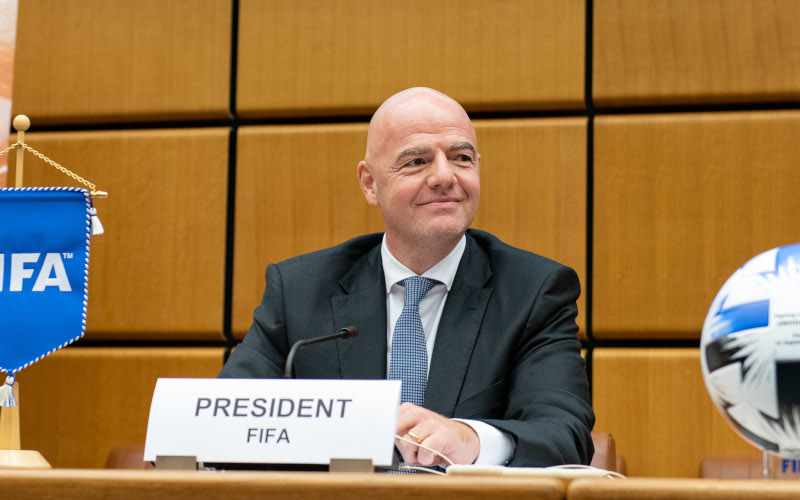Are FIFA right that more football is always better?
FIFA president Gianni Infantino has made a call for “way more football” to be played following his recent re-election. This will have been music to the ears of some of the federations that voted for him. However, many others were letting out an exhausted sigh when hearing this refrain from the boss of global football.
World Cup expansion
Infantino’s vision of “way more football” is exemplified by an expansion of the men’s World Cup to 48 teams. FIFA approved this change back in 2017. After the 2022 World Cup was a sporting success with the current format, however, some have begun to ask questions.
The initial plan for 48 teams was to split them into sixteen 3-team groups. This format drops the current element of all teams playing their final game at the same time. Furthermore, with only one of the three teams eliminated in each group, a team that draws all three of its games could qualify from many groups. This hardly seems an invitation for attacking, exciting football.
FIFA has now promised a change back to 4-team groups after the format worked well again in Qatar. However, they will keep the expansion to 48 teams. The result will be a World Cup consisting of a staggering 88 games (vs. 64 in the existing format). It will also see the unfortunate return of third-placed teams qualifying from groups.
Champions League expansion
Infantino’s comments also come alongside UEFA’s planned expansion of the group stages of the Champions League.
Four extra teams will participate in the tournament from 2024. Each team in the group stage will now play ten games, as part of a larger league format.
These changes are themselves something of a concession: one made to clubs in order to reduce the threat of a breakaway European Super League.
Why play more games?
Expanding these competitions means more games to sell to TV companies and to sponsors, generating additional revenue.
In the case of the World Cup, expanding the competition will also mean that more teams qualify. This is why the measure has been popular among many national federations. Federations like the enhanced qualification odds for their own teams and have voted accordingly.
International Context
FIFA is in rude health financially and expanding the game can seem somewhat like business as usual.
However, there are some wider signs which do suggest some changes are necessary.
Sport viewership worldwide is decreasing, likely due to the increased availability and diversity of entertainment offerings in general. Although football feels well-insulated from this with many of its events (including the World Cup) being one of the few exceptions, FIFA will be paying attention to this.
Indeed, FIFA has previously commented about needing to change football to attract younger viewers with shorter attention spans. But is more football really the way to achieve that?
Less can be more
Top-level football coaches have been sounding the alarm bells about asking their players to play more games for some time now. Pep Guardiola and Jürgen Klopp, amongst others, have raised concerns with adding more games to an already-busy schedule.
Champions League group-stage games do not attract the same excited viewership as the later rounds of the competition. This trend is in line with other sports worldwide where for example the NBA regularly sees much greater audiences for its playoff competition than the regular season.
This is not particularly surprising: knockout rounds have greater jeopardy and drama as well as teams tantalizingly close to tasting the glory of winning the entire competition.
The NFL is the only US sport consistently growing its viewership every year. The NFL plays just 17 regular season games per team. This means high scarcity and also, of course, high drama. Each game is much more significant to whether a team makes the playoffs or wins its division.
The English Premier League is another sports league that bucks the wider trends, continuing to grow viewership. However, the largest recent boost in viewership was in 2020/21. This increase was attributed to the increased number of live games shown on TV due to stadia being closed for SARS-CoV-2 lockdowns. Growing access could be a more productive way of spreading the game than simply playing more of it.
A solution in waiting
Whilst most in European football are calling for less football, there is one area where coaches are asking for more games to be played.
The Leicester City women’s team manager, Willie Kirk, called for more games earlier this week. He argued that the consistency of playing at home every two weeks, instead of every month, was necessary to build an attendance habit in fans. This in turn is needed to gradually transition to playing women’s games in larger stadia.
Teams in England’s women’s top flight play just 22 games a season, compared to the men’s 38. This suggests that this is indeed an area where more football might actually be welcomed. These extra games would help create a genuine growth in interest in the sport.
Similarly, football federations all over the world voted for Infantino’s new programme. There are definitely places on the planet where football isn’t as popular. In these areas, funding more games and competition can help expand the game. This in turn would bring benefits to local communities through playing organised sport.
Infantino did reference these areas in his speech, saying “in most parts of the world there is not enough football played“. FIFA must now make sure that they add “way more football” in the right places. The aim should be to open doors and spread the game and all the positives it can bring. This should be the focus, not extracting more cash from TV companies and sponsors for yet another round of unappealing group stage matches.
